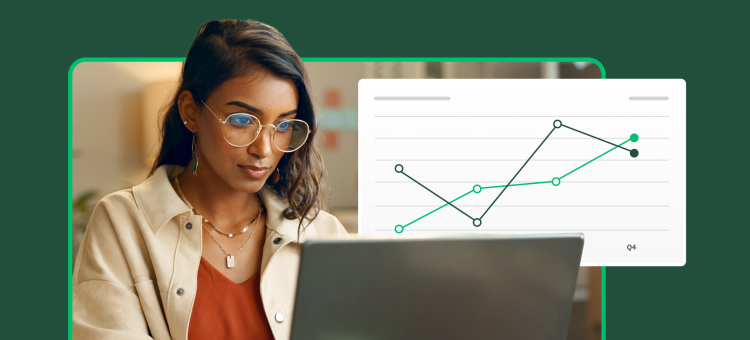In observation of Mental Health Awareness Month in the U.S., we surveyed Americans to check-in on how they are feeling. We discovered widespread self-reported mental health issues across various demographics, and explored the challenges of being constantly online.
Key findings:
- The majority (59%) of adults say they’ve experienced negative thoughts or symptoms relating to mental health issues in the last 30 days
- Women, LGBTQ adults are more likely to say they experience mental health issues
- Adults age 18-34 are more likely than those 35 and above to say they’ve experienced a negative thought or symptom related to a mental health issue in the last 30 days
- Frequent social media users (those who use it “several times a day”) say they experience mental health issues at far higher rates than non-social media users (62% vs. 42%)
- LGBTQ adults are most likely to say that social media harms their mental health
- Social media users who say social media has made their mental health “a lot worse” overwhelmingly do not seek help from mental health professionals (just 22% do)
- Social media users with personalized ads say they’re most likely to experience mental health issues
Majority have experienced a mental health issue in the last month
Almost 6 in 10 (59%) adults say they’ve experienced negative thoughts or symptoms relating to mental health issues in the last 30 days (39% say they haven’t) according to a new SurveyMonkey poll. Among those who experienced negative thoughts or symptoms:
- 38% say they’ve had trouble falling asleep, staying asleep or sleeping too much
- 30% say they’ve disliked the way their body looks
- 23% say they’ve had feelings of anxiety interfere with daily activities
- 20% say they’ve felt lonely
- 19% say they’ve had feelings of sadness interfere with daily activities
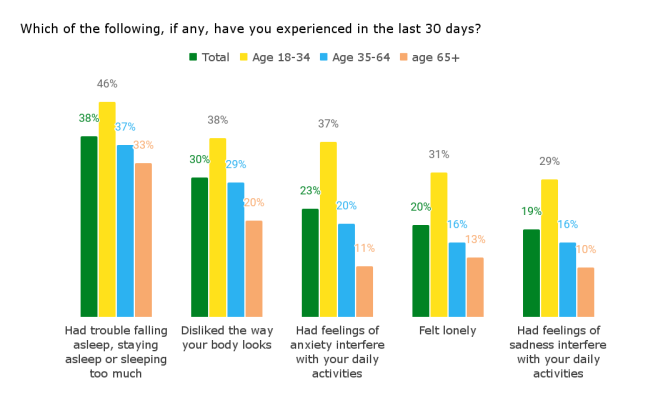
Young adults are hit particularly hard: adults age 18-34 are more likely than those 35 and above to say they’ve experienced a negative thought or symptom related to a mental health issue, with almost half (46%) citing trouble falling asleep, staying asleep or sleeping too much, followed by disliking how their body looks (38%), or having feelings of anxiety interfere with their daily activities (37%).
- Those who have seen advertisements related to anxiety, depression, loneliness, sleep or body image in the last 30 days are far more likely than those who haven’t seen these types of ads to say they’ve experienced a mental health issue (69% vs. 38%)
Women are more likely than men to admit they are experiencing negative symptoms related to mental health, and be proactive about addressing those needs
More women than men report experiencing negative symptoms related to mental health issues.
- 43% of women say they’ve had trouble falling asleep, staying asleep or sleeping too much compared to 34% of men
- 36% of women have disliked the way their body looks compared to 22% of men
- 27% have had feelings of anxiety interfere with their daily activities compared to 18% of men.
- 22% of women have felt lonely compared to 16% of men
- 22% of women have had feelings of sadness interfere with their daily activities compared to 15% of men
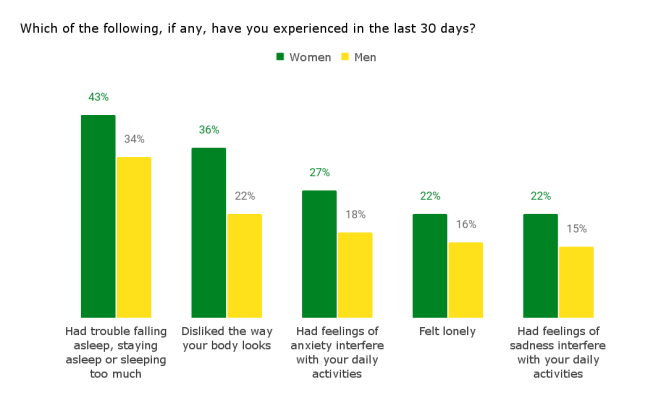
Women are also more likely than men to find ways to address their mental health needs, roughly in line with an October 2021 National Center for Health Statistics report which found that women were more likely than men to have received any mental health treatment (i.e. medication, therapy or both). Our poll finds women were likely to address their needs either by talking to a friend or a family member or through medication.
- 52% of women talked to a friend compared with 41% of men
- 24% of women take a prescription for anxiety or depression compared to 12% of men
- Women were slightly more likely than men to talk to a licensed mental health professional (15% vs. 11%)
6 in 10 LGBTQ individuals say they are “constantly” online, and half say they spend too much time in social media
Nearly all (94%) LGBTQ individuals say they use the internet several times a day, with nearly two-thirds (62%) saying they are “almost constantly” online (48% of heterosexual, cisgender individuals say they are “constantly online”).
- Zooming into social media, more LGBTQ individuals say they spend more time on social media (61%) than heterosexual, cisgender individuals (49%).
- LGBTQ individuals are more likely than heterosexual, cisgender individuals to say they spend time on all social media platforms–except Facebook–and spend significantly more time on Instagram (56% vs 39%), TikTok (45% vs 27%), Snapchat (37% vs 21%), Twitter (36% vs 19%), and Reddit (24% vs 11%).
- Nearly half (48%) of LGBTQ individuals say they spend “too much” time on social media, compared to 35% of heterosexual, cisgender individuals.
- More than a third of LGBTQ (37%) individuals say social media negatively impacts their mental health, compared to 23% of heterosexual, cisgender individuals.
LGBTQ adults are far more likely than their heterosexual or cisgender counterparts to say they’ve experienced a mental health issue in the last 30 days (82% vs. 57%). In the last 30 days:
- 50% of LGBTQ individuals say they have disliked the way their body looks, compared to 28% of heterosexual, cisgender individuals
- 58% of LGBTQ individuals say they have had trouble falling asleep, compared to 37% of heterosexual, cisgender individuals
- 45% have had feelings of anxiety interfere with their daily activities, compared to 21% of heterosexual, cisgender individuals
- 38% have had feelings of sadness interfere with their daily activities, compared to 17% of heterosexual, cisgender individuals
- 39% have felt lonely, compared to 18% of heterosexual, cisgender individuals
The LGBTQ community is much more likely than heterosexual, cisgender individuals to take steps to address their mental health:
- 60% vs 45% have talked to a friend
- 49% vs 44% have talked to a family member
- 28% vs 12% have talked to a licensed mental health professional
- 15% vs 8% have used a mental health app
- 38% vs 17% take a prescription for anxiety or depression
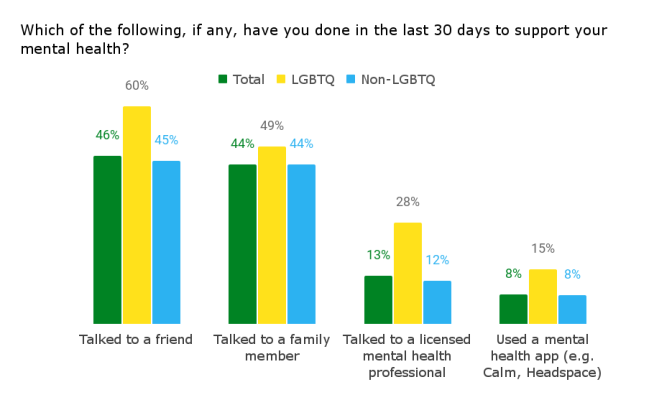
Frequent social media usage has a strong impact on mental health
About 6 in 10 (67%) adults who use social media “several times a day” say they’ve experienced a mental health issue in the last 30 days – 20 points higher than non-social media users (43%).
- Self-awareness of social media usage impacts mental health: 44% of those who say they spend “about the right amount” of time on social media say they haven’t experienced a mental health issue in the last 30 days – almost double that of those who say they spend “too much” time on social media (26%)
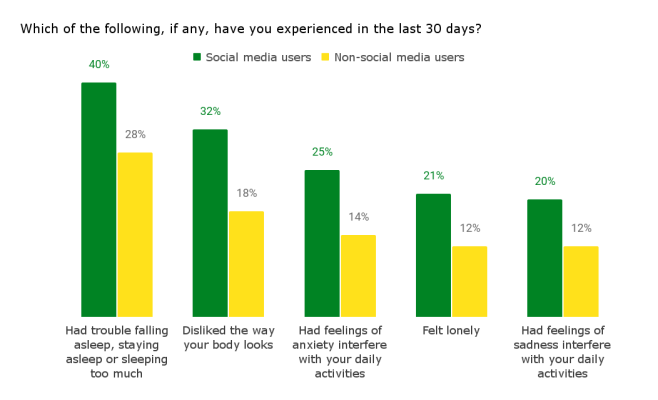
The majority of social media users (55%) say social media has had no impact on their mental health. Among the rest, more say social media has made their mental health worse than say it has made it better (25% vs. 19%).
- 44% of Gen-Z says social media has made their mental health worse, far greater than the impact on Millenials (30%) and more than twice the rate among Gen-X (20%), Baby Boomers (15%) and the Silent Generation (9%)
For those struggling with their mental health, social media is a double-edged sword: 50% of adults who rate their mental health as “poor” say social media has made it worse. On the other hand, a quarter (24%) of adults with “poor” mental health also say social media has made their mental health better. In comparison, about half (13%) of adults with “excellent” mental health say the same.
But few seek professional support: just 13% say they’ve talked to a licensed mental health professional in the last 30 days to support their mental health, roughly on par with an October 2021 National Center for Health Statistics report (10% received counseling or therapy from a mental health professional). Most say they’ve either talked to friends (46%) or family (44%) while just a few (8%) have used a mental health app like Calm or Headspace.
- Non-social media users were far more likely to say they haven’t done anything to support their mental health compared with social media users (47% vs. 30%)
- 28% of transgender adults say they’ve talked to a licensed mental health professional vs. just 12% of cisgender adults
Not all platforms are equal
Mental health issues vary by social media platform: Snapchat users were most likely to say they disliked how their body looks (46%) and Reddit users were among the most likely to cite feelings of anxiety (42%) or sadness (33%), but overall Twitch users are most likely to say they’ve experienced a mental health issue in the last 30 days (75%).
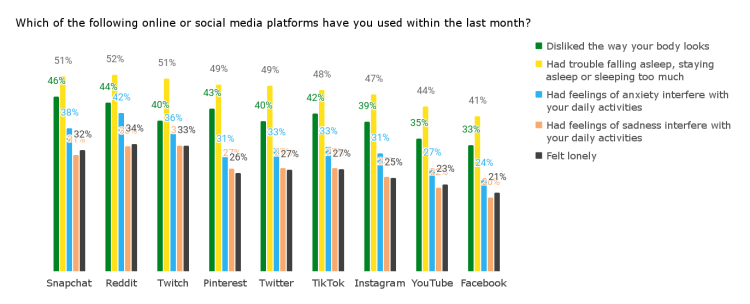
media (52% of Reddit users; 52% of Snapchat users) compared to users of other platforms.
- Users of both platforms skew younger (55% of those 18-24 use Snapchat; 25% of those 18-24 use Reddit)
- Men are more likely than women to use Reddit (16% vs. 9%) while women are slightly more likely than men use Snapchat (25% vs. 20%)
Users of different platforms have different ad experiences too: the majority of those with personalized ads say they’ve used Facebook (75%) and Youtube (73%) in the past 30 days while just 17% of those with personalized ads used Reddit in the last 30 days.
For many, ads do more than sell products
The majority of social media users (67%) say the advertising on their social media feed(s) is personalized while just 37% of social media users say the ads on their feeds aren’t.
Those who have seen more personalized ads are more likely than those who haven’t seen personalized ads to say they’ve experienced anxiety, depression or another mental health issue in the last 30 days.
- 40% of those with “very personalized” ads say they disliked the way their body looks while just 17% of adults whose ads are “not personalized at all” say the same.
However, those with more personalized ads may experience higher rates of mental health issues because they are spending more time on the internet (65% of those with “very personalized” ads say they use social media several times a day vs. 45% of those whose ads are “not personalized at all”). Similarly, those who felt they spent “too much” time on social media were almost twice as likely to say they disliked the way their body looks compared with those who spend “about the right amount of time” (27%) or “too little” time (20%).
Additionally, those with personalized ads tend to be younger (72% of Gen-Z say their social media ads are personalized, the highest of any age group) and young adults are more likely to spend more time on social media (65% of those 18-34 use social media “several times a day” vs. those 34-65 (47%) and 65+ (33%).
Similarly, those who say their social media ads are personalized are more likely than those who don’t have personalized social media ads to say they’ve seen advertisements related to anxiety, depression, loneliness, sleep or body image in the last 30 days (74% vs. 63%).
- Considering that nearly two-thirds (64%) of women say their advertising feeds are personalized, it may not be surprising that women are also more likely than men to report seeing an advertisement about anxiety (48% vs. 38%) or depression (54% vs. 44%) in the last 30 days.
- LGBTQ individuals may be even more targeted as 7 in 10 (70% say their feeds are personalized, compared to 61% of heterosexual, cisgender individuals. Additionally, LGBTQ individuals are also more likely to see advertisements about anxiety (52% vs 43%), loneliness (27% vs 20%, and body image (38% vs 31%).
But, targeted advertising on social media really works: 67% of those who say their social media ads are personalized say they’ve made a purchase based on an ad seen on social media – almost twice as high as those who say their ads aren’t personalized (37%).

